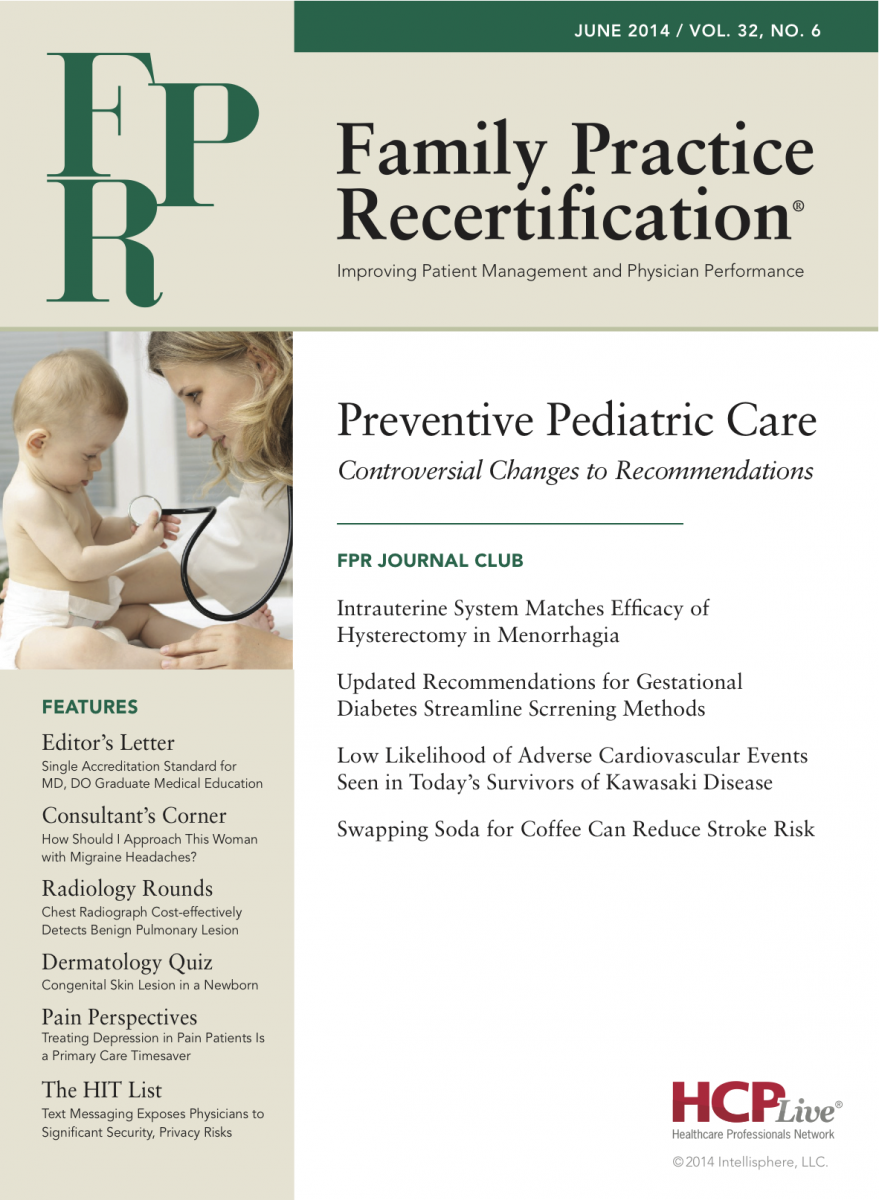Publication
Article
Family Practice Recertification
Swapping Soda for Coffee Can Reduce Stroke Risk
Author(s):
Perhaps, a very simple change in beverage choice could reduce the stroke burden in the United States.
Review
Bernstein AM, de Koning L, Flint, AJ, Rexrode KM, Willett WC. Soda consumption and the risk of stroke in men and women. Am J Clin Nutr. 2012 Apr 4;95:1190-9. http://ajcn.nutrition.org/content/early/2012/04/03/ajcn.111.030205.abstract.
Study Methods
This follow-up examination of 2 large, prospective cohorts reviewed data on soda consumption and stroke incidence among 84,085 female nurses aged 30-55 years and 51,529 male healthcare professionals aged 40-75 years.
Based on food-frequency questionnaire responses gathered during each 2-year follow-up cycle, the participants were stratified by their average cumulative intake of carbonated beverages categorized as follows:
- Low-calorie cola with caffeine, such as Diet Coke
- Low-calorie cola without caffeine, such as Pepsi Free
- Other low-calorie carbonated beverages, such as Diet 7 Up and Diet Mountain Dew
- Sugar-sweetened cola with caffeine, such as Coca-Cola and Pepsi
- Sugar-sweetened cola without caffeine, such as caffeine-free Coca-Cola and caffeine-free Pepsi
- Other carbonated beverages with sugar, such as 7 Up, Mountain Dew, and Dr. Pepper
Results and Outcomes
Overall, the authors documented 1,416 strokes in men throughout 841,770 person-years of follow-up and 2,938 strokes in women throughout 2,188,230 person-years of follow-up.
Total Stroke
After adjusting for dietary and non-dietary cardiovascular disease (CVD) risk factors, greater intake of sugar-sweetened and low-calorie soda was associated with an increased risk of general stroke in both men and women, though the risk of stroke with any soda consumption was higher in women.
Among men, there was a nonsignificant increase in stroke risk after consuming ≥1 serving of sugar-sweetened beverages per day, but among women, there was a statistically significant increase in risk equivalent to absolute risk differences of 24 cases per 100,000 person-years. Similarly, the results for low-calorie soda were only statistically significant in women, with absolute risk differences of 21 cases per 100,000 person-years.
Stroke Type
In women, greater consumption of sugar-sweetened soda was associated with increased risk of ischemic stroke, and greater consumption of low-calorie soda was associated with an increased risk of both hemorrhagic stroke and subarachnoid hemorrhage. Although there were no significant differences in men, the association between low-calorie soda and hemorrhagic stroke held true when the results of both sexes were pooled.
Stroke Risk After Substituting Soda with Alternative Beverages
Substituting one serving of soda for one serving of caffeinated or decaffeinated coffee on a daily basis was associated with a significantly reduced risk of stroke. Compared to a single daily serving of sugar-sweetened soda, one serving of caffeinated or decaffeinated coffee per day was associated with a respective 9% or 10% lower stroke risk, and compared to a single daily serving of low-calorie soda, one serving of caffeinated or decaffeinated coffee per day was associated with a respective 11% or 13% lower stroke risk.
Conclusion
Consumption of sugar-sweetened and low-calorie soda significantly increased the risk of stroke, especially in women.
Commentary
This analysis demonstrated that greater consumption of sugar-sweetened and low-calorie soda is associated with an increased risk of stroke in the general population, though the correlation was only statistically significant in women.
Interestingly, more frequent consumption of sugar-sweetened soda was associated with more frequent consumption of red meat and whole-fat dairy products, and greater consumption of low-calorie soda was linked to higher rates of chronic disease and greater body mass index (BMI).
However, this study’s observational nature permitted a variety of confounding and bias, including:
- Did the responders overestimate or underestimate their soda intake?
- Were the participants’ recollections of drink type accurate?
- Did the survey adequately account for comorbidities?
Nonetheless, substituting soda with coffee resulted in a roughly 10% decrease in the risk of stroke, suggesting that coffee has inherent benefit in reducing stroke, while also begging the question of whether swapping soda for water would influence a person’s stroke risk. Perhaps, a very simple change in beverage choice could reduce the stroke burden in the United States.
About the Authors
Amy Watson, MD, is a recent graduate of the University of Massachusetts Medical School (UMMS) in Worcester, MA.
She was assisted in writing this article by Frank J. Domino, MD, Professor and Pre-Doctoral Education Director for the Department of Family Medicine and Community Health at UMMS and Editor-in-Chief of the 5-Minute Clinical Consult series (Lippincott Williams & Wilkins).






